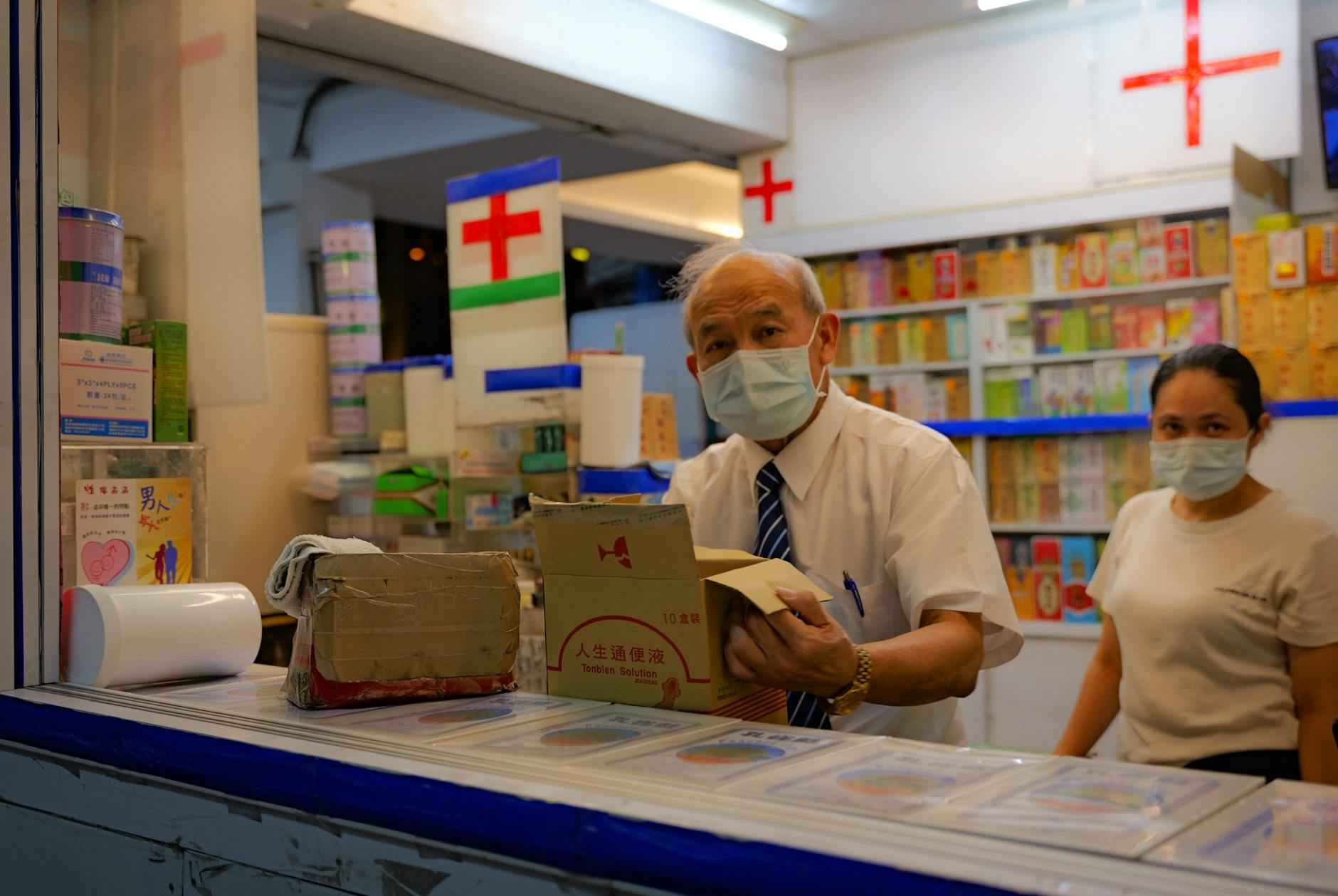This article explores the ins and outs of retail clinics in pharmacies, including when to go, what to expect, and why you might wanna consider them for your health needs.
Understanding Retail Clinics
Retail clinics, you know, are basically like mini-hospitals located in pharmacies. They offer a range of services, but I’m not really sure how they compare to traditional doctors. It’s like, do they have the same qualifications? Not really sure, but it’s something to think about.
Convenience is Key
One of the biggest reasons people visit retail clinics is convenience. You can just walk in, which is great if you don’t have time to schedule an appointment, right? Like, who has time for that?
- Walk-In Appointments
- Short Wait Times
- Extended Hours
You don’t need to have an appointment to see a provider at these clinics. It’s kinda like a fast-food joint for your health, but maybe that’s not the best analogy. I mean, who wants to compare their health to burgers and fries?
Usually, the wait times are shorter than at a regular doctor’s office. But sometimes, you might find yourself waiting longer than expected, which is super annoying. Like, come on, I thought this was supposed to be quick!
Many retail clinics offer extended hours, which is perfect for those of us who work 9 to 5 jobs. But, they might not be open late enough for night owls like myself. Why can’t they just stay open all night?
Services Offered
Retail clinics provide a variety of services, from vaccinations to minor injuries. But, it’s important to know what they can and can’t do for you, ya know? Like, can they really handle everything? I kinda doubt it.
Cost-Effectiveness
Going to a retail clinic can be cheaper than visiting your regular doctor. But, I guess it depends on your insurance and what services you need. It’s like a lottery, and nobody wants to lose money on healthcare.
- Insurance Coverage
- Out-of-Pocket Costs
Some insurance plans cover retail clinic visits, while others don’t. It’s like a game of chance, and it’s frustrating. Who wants to deal with that?
If you don’t have insurance, the out-of-pocket costs can still be reasonable. But, you know, it’s always better to check prices first before you go. Otherwise, you might be in for a surprise!
Common Conditions Treated
Retail clinics are great for treating common conditions like colds and allergies. But, if you have something more serious, you might wanna think twice before going. I mean, is it really worth the risk?
- Minor Illnesses
- Preventive Care
Things like strep throat or a simple flu are usually treated at these clinics. But, I mean, if you’re feeling really bad, maybe go see a real doctor? Just saying.
They also offer preventive care like immunizations. It’s a quick way to stay healthy, but sometimes I wonder if it’s enough. Like, can a shot really do all that?
Considerations Before Visiting
Before you decide to visit a retail clinic, there are a few things to think about. It’s not as simple as just walking in, believe me. Like, are you even prepared for what you might find?
- Your Health Condition
- Time of Day
If you have a chronic condition, maybe it’s better to stick with your regular doctor. But, who am I to judge? Everyone has their own preferences.
The time you go can really affect your experience. Mornings might be busier than evenings, but honestly, it’s hit or miss. You just never know!
Conclusion
In summary, retail clinics can be a good option for quick health needs, but they’re not for everyone. It’s all about weighing your options and figuring out what works best for you. So, the next time you’re feeling under the weather, maybe think about popping into a retail clinic instead of waiting forever at your doctor’s office!

Understanding Retail Clinics
So, like, retail clinics are these little health spots you find in pharmacies, kinda like mini-hospitals, right? They provide a bunch of services, but honestly, I’m not really sure how they stack up against traditional doctors. I mean, do they really have the same expertise? Maybe it’s just me, but I feel like there’s a lot to unpack here.
First off, let’s talk about the services offered. Retail clinics can handle things like colds, flu shots, and even some minor injuries. But, you know, if you’re dealing with something major, like a heart condition, you might wanna think twice before just walking in. It’s like, do you really wanna risk your health for convenience? Not really sure why this matters, but it does.
| Service | Description |
|---|---|
| Vaccinations | Quick and easy immunization shots. |
| Minor Illnesses | Treatments for colds, flu, and strep throat. |
| Health Screenings | Basic check-ups and screenings for common conditions. |
Another thing is the cost-effectiveness. I mean, who doesn’t wanna save a buck, right? Going to a retail clinic can be cheaper than hitting up your regular doctor’s office. But then again, it really depends on your insurance plan. Some cover these visits, while others are like, “Nope, not today!” It’s like a game of roulette with your health.
- Insurance Coverage: Some plans cover retail clinics.
- Out-of-Pocket Costs: Usually reasonable, but check before you go.
Now, let’s get into when to actually visit one of these clinics. If you’ve got a minor issue, it’s probably a good idea. But if you’re feeling really bad, like, you can’t get outta bed bad, maybe just go see a real doctor. Seriously, don’t play around with your health.
Also, don’t forget about the convenience factor. You can just walk in without an appointment, which is super appealing for those of us who have busy schedules. But, sometimes, you might end up waiting longer than you thought. It’s like waiting for your food at a restaurant, and you’re just sitting there, staring at the clock, wondering if you made the right choice.
And the hours of operation? Some clinics are open late, but not all of them. If you work a 9 to 5, that can be a real pain. You don’t wanna be stuck at work when all you need is a quick check-up.
In conclusion, retail clinics can be a good option for quick health needs, but they’re not for everyone. You gotta weigh your options and figure out what works best for you. So, next time you think about heading to one of those mini-hospitals, just remember to keep all this in mind. It could save you a lot of hassle and maybe even some cash!

Convenience is Key
When it comes to health care, the first thing that pops into my mind is convenience. Like, who has time to sit around waiting for an appointment that might not even happen on time? Not me. That’s why retail clinics are becoming super popular, especially for people who are always on the go. You can just walk in, which is great if you don’t have time to schedule an appointment, right? But, is it really that simple? Maybe it’s just me, but I feel like there’s more to it than just walking in.
- Immediate Access: One of the biggest draws to these clinics is that you can get seen without the hassle of making an appointment. You just stroll in and hope for the best. It’s kinda like a game of chance, but for your health.
- Shorter Wait Times: Typically, you can expect to wait less than you would at a regular doctor’s office. But, don’t get your hopes up too high. Sometimes you might find yourself sitting there longer than you anticipated. It’s like waiting for a bus that’s late, which is just plain annoying.
- Extended Hours: Many of these clinics have hours that cater to people who work 9 to 5. So, if you’re a night owl, you might be out of luck. But hey, at least you can go after work without feeling like you’re breaking the rules.
But, I gotta wonder, are these clinics really worth it? I mean, sure, they’re convenient, but what about the quality of care? It’s not like they have the same resources as a full-blown hospital. You might get a band-aid for a problem that needs stitches. You know what I mean?
| Pros | Cons |
|---|---|
| Convenient Access | Limited Services |
| Shorter Wait Times | Variable Quality |
| Extended Hours | Not All Insurance Accepted |
And let’s not forget about the cost. Sometimes, going to a retail clinic can be cheaper than visiting your regular doctor. But it all depends on your insurance plan. Some plans cover these visits, while others are like, “Nah, we don’t do that.” It’s like playing a game of roulette with your health and finances.
Also, if you don’t have insurance, the out-of-pocket costs might still be reasonable. But, I mean, who wants to pay for something they could’ve gotten for free at a regular doctor’s office? It’s always better to check prices first before you go. You don’t wanna be hit with a surprise bill, right?
In conclusion, while retail clinics are great for quick health needs, they’re not for everyone. It’s all about weighing your options and figuring out what works best for you. So, next time you think about walking into one of these clinics, just remember to think it through first. It might save you some trouble down the line. But then again, who am I to tell you what to do?
Walk-In Appointments
When to Visit a Retail Clinic Inside Your Local Pharmacy
This article explores the ins and outs of retail clinics in pharmacies, including when to go, what to expect, and why you might wanna consider them for your health needs.
Understanding Retail Clinics
Retail clinics are basically like mini-hospitals located in pharmacies. They offer a range of services, but I’m not really sure how they compare to traditional doctors.
Convenience is Key
One of the biggest reasons people visit retail clinics is convenience. You can just walk in, which is great if you don’t have time to schedule an appointment, right?
You don’t need to have an appointment to see a provider at these clinics. It’s kinda like a fast-food joint for your health, but maybe that’s not the best analogy. You just pop in, and boom, you’re in line like you’re waiting for a burger. But, I guess it’s not really the same, because, you know, health is kinda serious. But hey, the idea of not waiting weeks for an appointment is a big deal, right?
Short Wait Times
Usually, the wait times are shorter than at a regular doctor’s office. But sometimes, you might find yourself waiting longer than expected, which is super annoying. Like, why am I here for an hour just to get a flu shot? It’s like they forgot about me or something. But, I guess that’s life, huh?
Extended Hours
Many retail clinics offer extended hours, which is perfect for those of us who work 9 to 5 jobs. But, they might not be open late enough for night owls like myself. It’s like, come on, I need to get my health sorted out after work, not during lunch break!
Services Offered
Retail clinics provide a variety of services, from vaccinations to minor injuries. But, it’s important to know what they can and can’t do for you, ya know? They’re not gonna perform surgery or anything crazy like that. But for stuff like a cold or allergies, they’re usually pretty good.
Cost-Effectiveness
Going to a retail clinic can be cheaper than visiting your regular doctor. But, I guess it depends on your insurance and what services you need. Sometimes, it feels like a gamble, like you’re playing a game of healthcare roulette. You might win, or you might lose.
Insurance Coverage
Some insurance plans cover retail clinic visits, while others don’t. It’s like a lottery, and nobody wants to lose money on healthcare. I mean, who even understands insurance anyway?
Out-of-Pocket Costs
If you don’t have insurance, the out-of-pocket costs can still be reasonable. But, you know, it’s always better to check prices first before you go. Nobody wants to be hit with a surprise bill that makes you wanna cry.
Common Conditions Treated
Retail clinics are great for treating common conditions like colds and allergies. But, if you have something more serious, you might wanna think twice before going. Like, I wouldn’t go in for a broken leg or something.
Considerations Before Visiting
Before you decide to visit a retail clinic, there are a few things to think about. It’s not as simple as just walking in, believe me. I mean, what if you don’t even know what’s wrong with you?
Your Health Condition
If you have a chronic condition, maybe it’s better to stick with your regular doctor. But, who am I to judge? I’m just a recent grad trying to figure this all out.
Time of Day
The time you go can really affect your experience. Mornings might be busier than evenings, but honestly, it’s hit or miss. Like, sometimes you walk in, and it’s packed, and other times, it’s like a ghost town.
Conclusion
In summary, retail clinics can be a good option for quick health needs, but they’re not for everyone. It’s all about weighing your options and figuring out what works best for you.
Short Wait Times
at retail clinics are one of the biggest draws for many people. You know, it’s like, who wants to sit around in a waiting room for hours, right? Usually, the wait times are shorter than at a regular doctor’s office. But sometimes, you might find yourself waiting longer than expected, which is super annoying. I mean, like, why does that happen? It’s almost like they can’t predict how many people are gonna show up. Maybe it’s just me, but I feel like they should have a better system in place.
So, let’s break it down. When you walk into a retail clinic, you might be greeted by a nurse or a medical assistant, and they’ll usually take your information pretty quickly. But then, you could end up sitting there for what feels like an eternity. It’s kinda like waiting for a bus that’s late, and you’re just staring at your phone, hoping time goes faster. The thing is, it can be a mixed bag. Sometimes you get in and out in no time, and other times, you’re left wondering if you should’ve just gone to your regular doctor.
| Pros | Cons |
|---|---|
| Shorter wait times compared to regular clinics | Sometimes unpredictable wait |
| Convenient locations | Limited services available |
| Extended hours | Staff may not know your history |
Another thing to consider is the time of day you decide to go. Like, mornings might be busier than evenings, but honestly, it’s hit or miss. Some people say that if you go right when they open, you’ll have a better shot at getting seen quickly. But then again, who wants to wake up early just to avoid waiting? Not me, that’s for sure!
- Tip: If you can, try to go during off-peak hours, like mid-afternoon.
- Bring something to keep you entertained, like a book or your favorite podcast.
- Don’t forget your insurance info, if you have it, because you might need it.
Now, I get that waiting is part of the deal when it comes to healthcare, but it’s just frustrating when you’re not prepared for it. You might think you’re just gonna pop in for a quick check-up, and then, surprise! You’re stuck there for ages. It’s like the universe is testing your patience or something.
In conclusion, while are a huge selling point for retail clinics, they can be a double-edged sword. You might get lucky and breeze through your appointment, or you could end up waiting longer than you ever anticipated. So, maybe it’s worth considering your options and planning ahead. Just because it’s convenient doesn’t mean it’s always the best choice for your health needs.
Extended Hours
at retail clinics can be a real lifesaver for those of us who are juggling a million things at once. I mean, who has time to sit in a waiting room for hours after a long day at work? Not me! Many of these clinics are open during evenings and even on weekends, which is super helpful. But, and this is a big but, they might not be open late enough for, you know, the night owls out there—like myself. Like, what’s the point of having a late-night snack if you can’t get your health checked out too, right?
So, here’s the deal. **Retail clinics** are designed with convenience in mind, but that convenience can sometimes be a bit limited. For example, if you work a 9 to 5 job, you might find it easy to swing by after work, but what if you’re one of those people who works late shifts? It’s like, why even bother, right? I mean, I’m not really sure why this matters, but it feels like there should be more options for people who don’t fit the typical schedule.
Now, let’s talk about the actual hours. Some clinics close by 7 PM, which is fine for most folks, but if you’re like me and you don’t even get off work until 6, that’s kind of a bummer. Sometimes, I wonder if the people who set these hours ever thought about us night owls. Maybe it’s just me, but it feels like they’re missing out on a whole demographic of people who could really use their services after hours. It’s like, hello? We exist too!
- Pros of Extended Hours:
- No need for appointments, just walk in!
- Shorter wait times compared to traditional offices.
- Convenient for those with busy schedules.
- Cons of Limited Hours:
- Not open late enough for night shift workers.
- Some locations may close early on weekends.
- Potentially crowded during peak times.
It’s also worth noting that while many clinics advertise their , not all of them offer the same level of service. Like, you might be able to get a flu shot at 8 PM, but if you have a more complicated issue, you might be out of luck. I mean, who wants to deal with that after a long day? Not me! And don’t even get me started on the fact that some clinics are closed on holidays. It’s like, can’t a person catch a break?
In conclusion, while the extended hours at retail clinics can be a blessing for some, they definitely don’t cater to everyone. I guess it’s all about weighing your options and figuring out what works best for your schedule. But seriously, if you’re a night owl, you might wanna do some research before you head out. Because let’s be honest, nobody wants to drive all the way to a clinic only to find out they’re closed. That would just be the icing on the cake of a bad day, wouldn’t it?
Services Offered
So, like, when it comes to retail clinics, they can be a real lifesaver for those minor health issues that pop up when you least expect it. But, let’s be honest, not all clinics are created equal, and there’s a bunch of stuff they can do and a bunch of stuff they can’t, ya know? Here’s a rundown of what you might find when you walk into one of those mini-hospitals at your local pharmacy.
- Vaccinations: Seriously, if you need a flu shot or something, retail clinics got you covered. They do offer a range of vaccines, but it’s not like they have every single one available. I mean, if you’re looking for some rare vaccine, you might be outta luck.
- Minor Injuries: Got a cut or a scrape? These clinics can help clean it up. But don’t expect them to do any major surgeries or anything. If you’re bleeding out, you should probably head to an actual hospital.
- Cold and Flu Treatments: They can prescribe you some meds for your nasty cold or flu, which is kinda nice. But, maybe it’s just me, but I feel like sometimes they just give you cough syrup and send you on your way.
- Allergy Relief: If you’re sneezing your head off, they can prescribe antihistamines. But, like, if you have serious allergies, you might wanna see a specialist, just saying.
- Skin Conditions: From rashes to acne, they can help with common skin issues. But, honestly, if it’s something weird, you might be better off with a dermatologist.
But hold up, before you rush out the door, there’s some things you gotta keep in mind. Not everything is a walk in the park. For example, the staff might not be as experienced as your regular doctor. And let’s be real, sometimes you just don’t get the same level of care.
| Service | Pros | Cons |
|---|---|---|
| Vaccinations | Quick and easy | Limited options |
| Minor Injuries | Convenient | No major procedures |
| Cold and Flu Treatments | Fast prescriptions | Basic care |
| Allergy Relief | Immediate help | Not for serious cases |
| Skin Conditions | Accessible | May need specialists |
In conclusion, retail clinics can be super helpful for those everyday health problems, but you gotta know their limits. If you’re feeling really sick or have something serious going on, it’s probably best to make an appointment with your regular doctor. They know you better and can give you the care you really need. But hey, if you’re in a pinch and need a quick fix, those clinics can do the trick, just don’t expect miracles.

Cost-Effectiveness
So, you know, going to a retail clinic can be cheaper than visiting your regular doctor. But honestly, it kinda depends on your insurance and what services you need. I mean, it’s not like you can just waltz in and expect everything to be a steal, right? There are some things to think about before you decide to take that leap.
- Insurance Coverage: Some insurance plans cover retail clinic visits, while others don’t. It’s like a game of chance, and nobody wants to lose money on healthcare. I’ve heard stories of people getting hit with huge bills just because they didn’t check their plan. Like, why is it so complicated?
- Out-of-Pocket Costs: If you don’t have insurance, the out-of-pocket costs can still be reasonable. But don’t just take my word for it, always better to check prices first before you go. I mean, who wants to get blindsided when they’re just trying to feel better?
Now, let’s talk about the services offered at these retail clinics. They can be pretty handy for minor stuff, like when you’ve got a cold or maybe a rash that just won’t quit. But if you’re dealing with something more serious, you might wanna think twice before heading there. Like, what if you have a broken bone? Not sure they can fix that.
| Common Services | Cost Range |
|---|---|
| Flu Shots | $20 – $40 |
| Strep Throat Tests | $50 – $100 |
| Minor Wound Care | $30 – $80 |
But, I gotta say, convenience is key here. You can just walk in, no appointment needed, which is super awesome if you’re busy. It’s kinda like a fast-food joint for your health, but maybe that’s not the best analogy. Sometimes you walk in expecting a quick fix, and you end up waiting longer than you thought. Like, seriously, how does that happen?
Also, the extended hours at these clinics are a lifesaver for those of us who work 9 to 5 jobs. But, they might not be open late enough for night owls like myself. It’s like, I get off work and I’m sick, but the clinic is closed? Just my luck, right?
In conclusion, retail clinics can be a good option for quick health needs, but they’re not for everyone. It’s all about weighing your options and figuring out what works best for you. Maybe it’s just me, but I feel like it’s worth giving them a shot for minor stuff. Just don’t forget to check your insurance, because nobody wants to get caught off guard by a surprise bill.
Insurance Coverage
is like a maze, and trust me, it can get pretty confusing. So, some insurance plans cover retail clinic visits, while others just don’t. It’s like a lottery, and nobody wants to lose money on healthcare. Seriously, who wants to play that game?
When you think about it, insurance coverage for retail clinics varies a lot. Some people are lucky enough to have plans that cover these visits, while others might find themselves stuck with a bill that feels like it’s been pulled out of thin air. Not really sure why this matters, but it’s crucial to check your benefits before you walk in the door. You don’t want to be that person who’s shocked at the register, right?
| Insurance Plan Type | Covers Retail Clinic Visits? |
|---|---|
| HMO | Sometimes |
| PPO | Usually |
| Medicare | Depends |
| Medicaid | Often |
Now, if you’re like me, you probably just want to know what’s the deal with out-of-pocket costs. If you don’t have insurance, the costs can still be reasonable, but it’s always best to check prices first. Imagine showing up only to find out you’re gonna pay an arm and a leg!
- Check your insurance policy.
- Call the clinic to ask about prices.
- Don’t forget to ask if there are any hidden fees!
It’s crazy how much you can save if you do your homework. But, maybe it’s just me, I feel like a lot of people don’t even know they have options. Like, did you know that some retail clinics offer discounts for cash payments? Yeah, it’s a thing!
Also, let’s talk about those annoying co-pays. Some clinics might charge you a flat fee, while others might have a co-pay that feels like it’s through the roof. You ever feel like you’re just throwing your money down a black hole? It’s frustrating, for sure!
So, if you’re going to visit a retail clinic, don’t go in blind. Check your insurance coverage, understand your potential costs, and maybe even bring a friend who knows more about this stuff. Trust me, it can save you a lot of headaches!
In conclusion, navigating insurance coverage for retail clinics can be tricky, but it’s totally worth it if you want to get care without breaking the bank. Just remember, not every plan is the same, and being informed is your best bet. So, go ahead, do your research, and make the most out of your health visits!
Out-of-Pocket Costs
can be a real headache, especially if you don’t have insurance. You might think that without insurance, the costs will be through the roof, but that’s not always the case. In fact, many people are surprised to find out that the out-of-pocket expenses can be quite reasonable. But, you know, it’s always a good idea to check prices before you go, right? Like, who wants to get hit with a bill that’s bigger than your rent?
So, let’s break it down a bit. When you walk into a retail clinic, you might be wondering how much it’s gonna cost you. Well, here’s the thing: prices can vary. They can range from as low as $50 for a basic consultation to over $150 for more complex services. Just a heads up, though, these prices are generally way cheaper than what you’d pay at a traditional doctor’s office. But, I guess it depends on what you need done. It’s kinda like shopping for groceries; you gotta look for the best deals.
- Basic Visit: $50 – $100
- Vaccinations: $20 – $100
- Minor Injuries: $75 – $150
Now, if you’re one of those people who think that checking prices is a waste of time, think again! It’s super important to do a little research before you just walk in. Sometimes, clinics might have hidden fees or charges that you didn’t see coming. It’s like finding out your favorite snack is actually expired when you get home. Not cool, right?
And if you do have insurance, well, that can complicate things even more. Some insurance plans cover retail clinic visits, while others don’t. It’s like playing a game of roulette, and nobody wants to lose money on healthcare. So, make sure you call your insurance provider before heading out. They might have a list of in-network clinics that could save you some cash. And if you don’t, then you might end up paying a lot more than you bargained for.
Also, keep in mind that some clinics offer discounts for cash payments. So if you’re feeling a bit strapped for cash, it might be worth asking about that. Not really sure why more people don’t take advantage of this, but hey, that’s just me.
| Service | Estimated Cost | Insurance Coverage |
|---|---|---|
| Basic Consultation | $50 – $100 | Varies |
| Vaccination | $20 – $100 | Partially Covered |
| Minor Injury Treatment | $75 – $150 | Check with Provider |
In conclusion, while the at retail clinics can be manageable, it’s always smart to do your homework first. You don’t wanna end up in a situation where you’re stuck with a bill that makes you question all your life choices. So, check those prices, call your insurance, and maybe even ask about discounts. It might just save you a few bucks, and who doesn’t love saving money?

Common Conditions Treated
Retail clinics are super popular for treating common conditions like colds and allergies. But, if you got something more serious, you might wanna think twice before heading there. I mean, who wants to be misdiagnosed, right? It’s like playing Russian roulette with your health.
- Minor Illnesses: These clinics are great for stuff like strep throat or the flu. But, honestly, if you’re feeling like you got hit by a bus, maybe just go see a real doctor?
- Preventive Care: They do offer immunizations and check-ups, which is kinda nice. But sometimes I wonder if a quick shot is really enough to keep me healthy, you know?
- Skin Conditions: Things like rashes or minor infections can be treated here. But if it looks like something out of a horror movie, you might wanna run to a specialist.
Now, I’m not saying these clinics are bad or anything, but there’s definitely a time and place for them. For example, if you got a nasty cold that just won’t quit, sure, go get checked out. But if you’re dealing with something more complicated, like chronic pain or mental health issues, it’s probably better to stick with a regular doctor.
Also, I feel like it’s important to mention that not all retail clinics are created equal. Some might be better than others at diagnosing and treating conditions. So, maybe do a little research before you just walk in. It’s like picking a restaurant—you wouldn’t choose the first one you see without checking the reviews, right?
| Condition | Treatment Offered | When to Go |
|---|---|---|
| Cold | Rest, fluids, maybe some over-the-counter meds | As soon as symptoms appear |
| Allergies | Antihistamines, advice on avoiding triggers | Whenever you feel the sniffles |
| Minor Injuries | Stitches, bandaging, basic first aid | If it’s not life-threatening |
And let’s not forget about the cost. Retail clinics can be cheaper than your regular doc, but it really depends on your insurance. I mean, it’s like a lottery, and nobody wants to lose money on healthcare. Some insurances cover these visits, while others treat them like they’re made of gold.
So, if you’re thinking about visiting a retail clinic, just weigh your options carefully. Sometimes, it’s better to stick with your regular doctor, especially if you have a chronic condition or something that needs more than just a quick fix. But if it’s something simple, like a cold or allergies, these clinics can be a lifesaver. Just don’t go in expecting a miracle cure for everything, because that’s not how it works.
In conclusion, retail clinics are great for quick fixes, but they’re not the end-all-be-all solution. You gotta know when to use them and when to seek out more serious medical help. It’s all about figuring out what works best for you and your health needs.
Minor Illnesses
are like those pesky little gremlins that just won’t go away, right? You know, things like strep throat or the good old flu are usually treated at these retail clinics. But, I mean, if you’re feeling really bad, maybe go see a real doctor? Not really sure why this matters, but it does.
So, let’s dive into what these clinics can do for you. They’re kinda like the fast-food joints of healthcare, if you think about it. You walk in, sit down, and before you know it, you’re being treated for whatever ails you. However, not every sniffle or cough should be handled here. Sometimes, it’s better to seek out a more comprehensive care from a traditional doctor.
- Strep Throat: This is a common one, right? You might walk in with a sore throat, and they’ll do a quick test. If it’s positive, you’ll walk out with antibiotics. Easy peasy!
- Flu: Got the flu? Retail clinics can help with that too. They can prescribe antiviral meds, but it’s usually better to go in early for the best results.
- Colds and Allergies: So, you got the sniffles? Retail clinics can help with that. Just don’t expect a miracle cure, okay?
But wait, there’s more! They also do other stuff like offering preventive care and vaccinations. It’s like a one-stop-shop for your minor health needs. But, let’s be honest here, if you’re feeling like you’ve been hit by a truck, maybe it’s time to see a real doctor. Just saying.
| Condition | Treatment Options | When to Visit a Doctor |
|---|---|---|
| Strep Throat | Antibiotics | If symptoms persist |
| Flu | Antivirals | If severe symptoms |
| Common Cold | Symptom Relief | If lasts more than 10 days |
Now, don’t get me wrong. Retail clinics are super convenient and can save you a ton of time. But, I feel like they shouldn’t be your first stop if you’re dealing with something serious. Maybe it’s just me, but I think it’s better to be safe than sorry.
Also, if you have a chronic condition, like diabetes or asthma, those retail clinics might not be the best place for you. You really need a doctor who knows your history, right? So, think about that before you just walk in.
In conclusion, retail clinics are great for treating minor illnesses. But, if you’re feeling really lousy or if your symptoms are severe, don’t hesitate to see a real doctor. After all, your health is important, and you deserve the best care possible. Just remember, it’s okay to question where you should go for treatment. It’s your health, after all!
Preventive Care
is like that one friend who always reminds you to take your vitamins, you know? They also offer preventive care like immunizations. It’s a quick way to stay healthy, but sometimes I wonder if it’s enough. I mean, sure, getting a flu shot is great and all, but does it really protect you from everything? Maybe it’s just me, but I feel like there’s more to staying healthy than just a couple of shots.
First off, let’s talk about the importance of preventive care. It’s kinda like putting on sunscreen before going to the beach. You might think you’re fine, but one sunburn later, you’ll be wishing you had listened. Preventive care helps catch issues before they become major problems, which is a big deal, right? But, I gotta admit, sometimes it feels like a bit of a gamble. Like, am I really preventing anything or just wasting time?
- Immunizations – They’re super important for preventing diseases, but not everyone gets them.
- Regular Check-Ups – These can help find health issues before they get serious. But who has time for that?
- Screenings – Things like blood pressure checks or cholesterol tests can be lifesavers. But honestly, they’re kinda boring.
And then there’s the whole accessibility issue. Retail clinics are popping up everywhere, which is awesome, but are they really equipped to handle everything? I mean, they can do basic stuff, but what if you have a nagging cough that just won’t quit? Not really sure if a quick visit is gonna cut it. It’s like going to a fast-food place for gourmet food. You might get something, but it’s probably not what you really need.
| Service | Pros | Cons |
|---|---|---|
| Immunizations | Quick and easy | Not always comprehensive |
| Check-Ups | Catch problems early | Can be time-consuming |
| Screenings | Identify risks | May require follow-ups |
Now, don’t get me wrong. I think preventive care is important, but sometimes I feel like it’s not enough. Like, what happens after you get your shot? Do you just go back to your normal life and hope for the best? It’s like putting a band-aid on a broken leg and calling it a day. Maybe I’m being too harsh, but I just feel like we need to do more.
In conclusion, preventive care is a crucial part of staying healthy, but it shouldn’t be the only thing we rely on. It’s like having a safety net, but you still gotta watch your step, you know? So, next time you think about skipping that flu shot or check-up, just remember: it’s better to be safe than sorry, but also, don’t forget to actually listen to your body. It’s talking to you, even if you don’t wanna hear it.

Considerations Before Visiting
So, you’re thinking about hitting up a retail clinic, huh? Well, hold your horses! There’s a few things you might wanna think about before just strolling in like you own the place. It’s not as simple as it seems, believe me. You might be surprised at what you need to consider.
- Your Health Condition: If you have a chronic condition like diabetes or asthma, maybe it’s best to stick with your regular doc. I mean, what if they don’t have your medical history? It’s like going to a restaurant and ordering a dish you never tried, right?
- Time of Day: The time you choose to go can really affect your experience. Mornings might be busier than evenings, but honestly, it’s hit or miss. Sometimes you just never know!
- Insurance Coverage: Check if your insurance covers retail clinic visits. It’s like playing a game of roulette, and nobody wants to lose money on healthcare, am I right? Some insurance plans are cool with it, others not so much.
- Available Services: Not every retail clinic will have the same services. Some might only do vaccinations, while others might treat minor injuries. It’s a bit of a mixed bag, so be sure to check ahead!
Now, let’s talk about wait times. You might think you can just waltz in and be seen immediately, but that’s not always the case. Sometimes, the wait can be longer than a trip to the DMV. And nobody wants that! I mean, who has time to sit around when you could be binge-watching your favorite show?
Also, consider extended hours. Many retail clinics are open late, which is awesome for those of us who work 9 to 5 jobs. But, if you’re a night owl like me, you might find they close earlier than you’d like. It’s like they don’t understand the concept of “night shift.”
And let’s not forget about the out-of-pocket costs. If you don’t have insurance, the prices can still be pretty reasonable. But, you know, it’s always better to check prices first before you go. I mean, who wants to be blindsided by a bill that looks like a mortgage payment?
In summary, retail clinics can be a good option for quick health needs, but they’re not for everyone. It’s all about weighing your options and figuring out what works best for you. Just remember, don’t rush into it. Take a moment to think about what you really need and whether a retail clinic is the right choice for you.
Considerations Before Visiting:- Your Health Condition- Time of Day- Insurance Coverage- Available Services- Wait Times- Extended Hours- Out-of-Pocket Costs
So, to wrap it up, don’t just walk in without thinking. It’s like going to a party without knowing if you’re invited. Maybe it’s just me, but I feel like being prepared is half the battle!
Your Health Condition
When it comes to deciding whether to visit a retail clinic or stick with your regular doctor, it’s important to consider your health condition. I mean, if you have a chronic condition, like diabetes or heart disease, maybe it’s better to stick with your regular doctor. But, who am I to judge? Sometimes, I feel like the world is just a big guessing game when it comes to health.
Retail clinics are great for minor issues, but if you have something ongoing, like high blood pressure, it might not be the best idea to just walk in. You know, you gotta think about your long-term health, right? It’s not just about the quick fix. But hey, if you’re just feeling under the weather with a cold, then sure, go ahead and pop into that clinic. It’s like a drive-thru for your health, but with less fries, I guess.
- Chronic Conditions: If you have something serious, you probably want a doctor who knows your history.
- Routine Check-Ups: Retail clinics don’t do those, so keep that in mind.
- Medications: If you need prescriptions for ongoing issues, it’s better to stick with your regular doc.
Now, don’t get me wrong. Retail clinics can be super useful for quick things. They’re like the fast food of healthcare. But, I guess it depends on what you’re looking for. If you just need a quick flu shot or something, then why not? But if you’re dealing with a complex health issue, you might wanna think twice. It’s kinda like going to a mechanic for a car problem that needs a full overhaul – not really the right fit.
Also, let’s talk about time constraints. If you’re super busy and can’t find time to see your regular doctor, then a retail clinic can be a lifesaver. But, if you’re just going for convenience, you might be missing out on the personalized care that your regular doc can provide. It’s like choosing a microwave dinner over a home-cooked meal. Sure, it’s quick, but is it really what you need?
And then there’s the whole insurance coverage thing. Some plans cover retail clinics, but others don’t. It’s like a game of roulette, and nobody wants to lose money on healthcare. If you’re not careful, you might find yourself paying out of pocket for something that could have been covered. So, always check your benefits before you go. It’s just common sense, right?
In conclusion, it’s all about weighing your options. If you have a chronic condition, it’s probably best to stick with your regular doctor. But if you’re just looking for a quick fix, then retail clinics can be a good option. Just make sure you know what you’re getting into. After all, your health is no laughing matter, even if I’m making jokes about it!
Time of Day
When it comes to visiting a retail clinic, the time you choose can really make a difference in your overall experience. Mornings can be a bit more hectic than evenings, but honestly, it’s a total hit or miss. Sometimes you walk in and it’s like a ghost town, and other times, you’re stuck waiting in line like it’s Black Friday. I mean, who knew getting a flu shot could feel like a sporting event, right?
In the mornings, you might find yourself surrounded by a crowd of people who are just as eager to get their health sorted out before heading to work. I get it, everyone’s got stuff to do, but it can feel like you’ve stepped into a waiting room that’s more like a social gathering. You might even catch a few people chatting about their weekend plans while you just sit there, tapping your foot impatiently. But then again, maybe it’s just me, but I feel like mornings are a gamble.
On the flip side, evenings can be a mixed bag too. Sure, you might think, “Hey, it’s after work, so it should be chill,” but nope! You could end up waiting longer than expected because everyone else had the same idea. It’s almost like there’s a secret club of late-night health seekers who all decided to show up at the same time. I guess it’s just one of those things you have to roll with, right?
Another thing to consider is the staffing during different times of day. Sometimes, you may find that there are fewer staff members available, which can lead to longer wait times. If it’s a busy time, you might end up feeling like you’re in a game of “how long can you wait before you lose your mind.” And let’s be honest, nobody wants to feel like they are just another number in the queue.
Also, let’s not forget about the extended hours that many retail clinics offer. This can be super helpful for those of us who work traditional 9 to 5 jobs. But if you’re one of those night owls who doesn’t even start thinking about health until the sun goes down, you might be out of luck. Some clinics close earlier than you’d expect, which can lead to some serious frustration when you finally decide to take care of yourself.
- Morning Visits: Often crowded, but you might get in and out quickly if you arrive early.
- Evening Visits: Can be unpredictable; sometimes less busy, sometimes packed.
- Staff Availability: Varies throughout the day; mornings might have more staff, but it’s not guaranteed.
- Extended Hours: Good for working folks, but check the clinic’s closing time!
In conclusion, the you visit a retail clinic can really shape your experience. Whether you’re a morning person or a night owl, it’s all about finding what works best for you. Just remember, it’s all a bit of a gamble, and sometimes you gotta roll the dice to see what you get!

Conclusion
When considering your health options, it’s important to take a step back and really think about what works best for you. Retail clinics inside pharmacies can be a good choice for those quick health needs, but they’re not the magic solution for everyone. It’s kinda like a fast-food joint for your health, you know? Not really sure why this matters, but it’s all about weighing your options and figuring out what fits your personal situation.
First off, let’s talk about the convenience factor. Retail clinics are designed to be accessible, with walk-in appointments and often shorter wait times. You just stroll in, and *boom*, you’re being seen by a healthcare provider. But, sometimes, you might find yourself sitting there longer than you thought. Seriously, it’s like waiting for your food at a restaurant that’s always busy. And don’t even get me started on the hours; some clinics close way too early for those of us who work late shifts.
- Convenience: Walk-ins and extended hours
- Cost-Effectiveness: Cheaper than regular doctor visits
- Services Offered: From vaccinations to treatment of minor injuries
Now, let’s chat about the services they offer. Retail clinics can handle common conditions like colds, allergies, and even minor injuries. But if you got something more serious, like a chronic illness, maybe it’s better to stick with your regular doctor. It’s like, do you really want to risk your health over a quick visit? Just food for thought.
Another thing to consider is the cost. Depending on your insurance, visiting a retail clinic can be way cheaper than going to your usual doctor. But, I mean, some insurance plans cover these visits while others don’t. It’s like a game of roulette, and who wants to gamble with their health? If you’re paying out of pocket, you might still find it’s reasonable, but you should probably check the prices before you go. Nobody wants to be hit with a surprise bill, right?
| Condition | Recommended Action |
|---|---|
| Cold | Visit a retail clinic |
| Flu | Visit a retail clinic |
| Chronic Illness | See your regular doctor |
So, before you head to a retail clinic, think about what you need. If you’re dealing with a chronic condition, maybe it’s best to stick with someone who knows your history. And the time of day you visit can really impact your experience. Mornings might be busier than evenings, but honestly, it’s hit or miss. It’s like trying to guess when the best time to go grocery shopping is — you just never know!
In conclusion, retail clinics can be a good option for quick health needs, but they’re not for everyone. It’s all about weighing your options and figuring out what works best for you. Maybe it’s just me, but I feel like having a clear understanding of your health needs can make all the difference. So, do your homework, and don’t just walk in blindly!
Frequently Asked Questions
- What services do retail clinics offer?
Retail clinics provide a variety of services including vaccinations, treatment for minor illnesses like colds and strep throat, and preventive care. They’re designed for quick visits, so you can get in and out without much hassle.
- Are retail clinics more affordable than traditional doctors?
Yes, visiting a retail clinic can be cheaper than going to your regular doctor, especially if you don’t have insurance. However, it’s always wise to check the costs beforehand to avoid any surprises.
- Do I need an appointment to visit a retail clinic?
Nope! One of the best things about retail clinics is that they usually accept walk-ins. It’s like grabbing a quick snack; you just pop in when you need to!
- Can I visit a retail clinic for serious health issues?
While retail clinics are great for minor health concerns, if you’re dealing with something serious, it’s best to see a traditional doctor. Think of retail clinics as a quick pit stop, not a full-service garage!
- What should I consider before visiting a retail clinic?
Before heading to a retail clinic, think about your health condition, the time of day, and whether your insurance covers the visit. It’s all about making sure you get the care you need without any hiccups!



